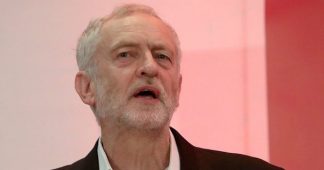It’s disturbing that Jeremy Corbyn’s comments on foreign policy were in any way controversial says Chris Nineham
By Chris Nineham
August 20, 2013
If you step back for a moment, it is disturbing that last night’s comments by Jeremy Corbyn on foreign policy were in any way controversial. Corbyn made two points, one general, the other more immediate. In the round, he wants a foreign policy that aims to ‘achieve a world where we don’t need to go to war’. In what kind of circles is that contentious? Secondly, and obviously connected, he wants to avoid war with Russia.
Asked about possible Russian interventions he refused to say Britain would go to the aid of a NATO member facing aggression, but instead focussed on diplomatic and political measures designed to avoid that scenario, explaining, ‘we can’t allow a military build-up which is going to lead to some calamitous, incredibly dangerous situation’.
Presumably most sane people would support active steps to avoid war with Russia. Such a war would be more calamitous even than those generated by Britain’s string of foreign policy disasters in Afghanistan, Iraq, Libya and Syria.
Corbyn’s implicit critique of NATO policy in Eastern Europe, too, is entirely appropriate. This year’s NATO summit in Warsaw in July decided on a policy of brinkmanship with Russia, including the deployment of four multinational battalions stationed on a rotating basis in Poland and three Baltic states: Lithuania, Latvia and Estonia. Altogether, some 4,000 troops will be deployed with around 650 coming from Britain and 1,000 from the US.
This follows, earlier in the year, the largest Western war game in Eastern Europe since the Cold War, involving 31,000 troops and thousands of vehicles from twenty four countries. Even NATO supporters were queasy about these moves. A defence attache at a European embassy in Warsaw is quoted as fearing a “nightmare scenario…a mishap, a miscalculation which the Russians construe, or choose to construe, as an offensive action”.
After the summit, former Soviet premier Gorbachev gave an idea of the view from Russia, “All the rhetoric in Warsaw just yells of a desire almost to declare war on Russia. They only talk about defence, but actually they are preparing for offensive operations.”
Of course NATO leaders present this historically significant escalation as reactive, but this view is simply unsustainable. Ever since the collapse of the Soviet Union, NATO powers have been pushing eastward, into areas everyone knows Russia regards as vital to its security. Since 1991 twelve countries have joined NATO in the area. Georgia and Ukraine were promised membership of NATO in 2008, despite repeated warnings from the Russian government that taking NATO to the Russian border would cause a security crisis.
Russia’s elites, including Putin, have in fact been looking for a security accommodation with the West since the end of 1990s. It is NATO expansionism in the East and unilateral western decision-making in other areas – in particular the move to regime change in Libya – that has ratcheted up the tension.
Corbyn’s argument about NATO are sensible and supported by the facts. What is really controversial in establishment circles, is that Jeremy Corbyn is committed to a break with the aggressive British foreign policy that has dominated since Blair. Like the majority of British people, he opposes the kind of unqualified commitment to Washington priorities roundly condemned in the Chilcot report.
Rather than just expressing regret over Iraq, he has apologized on behalf of the Labour Party for what most people believe to have been a disastrous decision. More than that – and this is what really riles – he is actually prepared to draw some conclusions from the chaos of the last fifteen years and try and act on them.
How irrational. Better surely to continue to ignore the past, make the same mistakes over and over again, and plunge the world into further disorder.
Published at http://www.stopwar.org.uk/index.php/united-kingdom/2124-last-briton-in-guantanamo-bay-shaker-aamer-sues-uk-government











